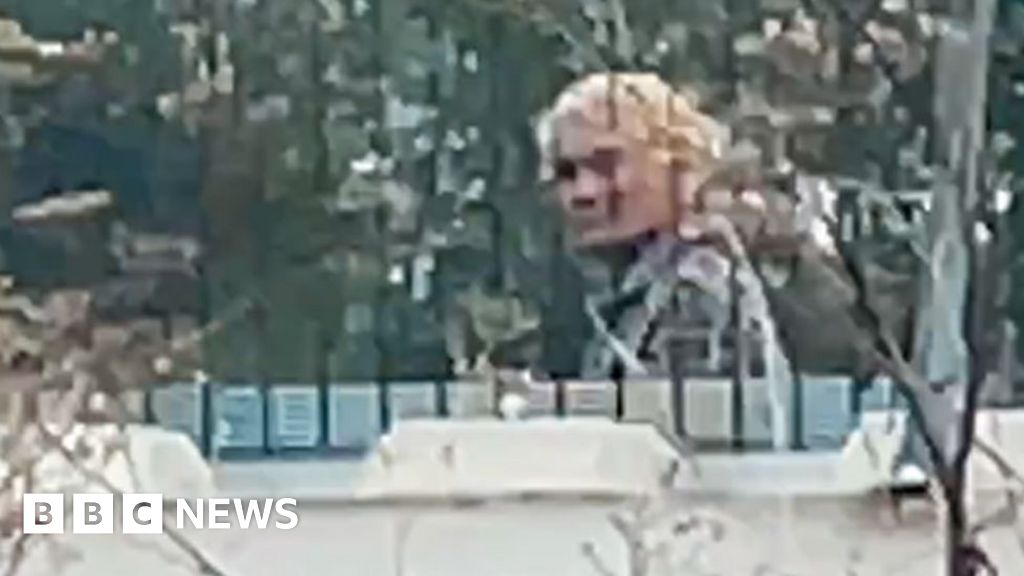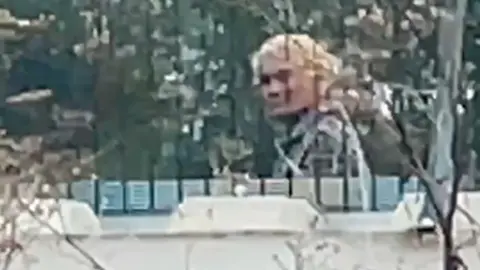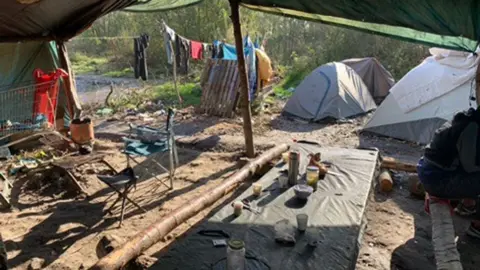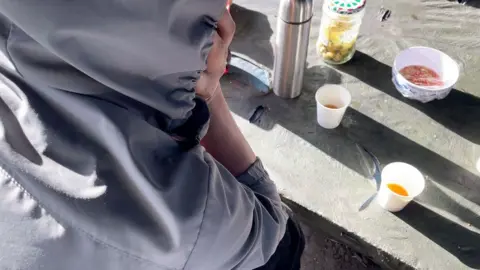Channel migrants: Vietnamese smugglers selling ‘priority’ service

 BBC
BBCThe Vietnamese people smuggler emerged, briefly and hesitantly, from the shadows of a scraggly forest close to the northern French coastline.
“Move away from the others. Come this way, fast,” he said, gesturing across a disused railway line to a member of our team, who had spent weeks posing undercover as a potential customer.
Moments later, the smuggler – a tall figure with bright dyed blonde hair – turned away sharply, like a startled fox, and vanished down a narrow path into the woods.
Earlier this year, Vietnam emerged – abruptly – as the biggest single source of new migrants seeking to cross the Channel to the UK illegally in small boats. Arrivals surged from 1,306 in the whole of 2023, to 2,248 in the first half of 2024.
Our investigation – including interviews with Vietnamese smugglers and clients, French police, prosecutors and charities – reveals how Vietnamese migrants are paying double the usual rate for an “elite” small boat smuggling experience that is faster and more streamlined. As the death toll in the Channel hits a record level this year, there are some indications that it might be safer too.
As part of our work to penetrate the Vietnamese operations, we met an experienced smuggler who is operating in the UK and forging documents for migrants seeking to reach Europe. Separately, our undercover reporter – posing as a Vietnamese migrant – arranged, by phone and text, to meet a smuggling gang operating in the woods near Dunkirk in order to find out how the process works.
“A small boat service is £2,600. Payment to be made after you arrive in the UK,” the smuggler, who called himself Bac, texted back. We heard similar figures from other sources. We believe Bac may be a senior figure in a UK-based gang and the boss of Tony, the blonde man in the woods.
He had given us instructions about the journey from Europe to the UK, explaining how many migrants first flew from Vietnam to Hungary – where we understand it is currently relatively easy for them to get a legitimate work visa, often obtained using forged documents. Bac said that the migrants then travelled on to Paris and then to Dunkirk.
“Tony can pick you up at the [Dunkirk] station,” he offered, in a later text.
Vietnamese migrants are widely considered to be vulnerable to networks of trafficking groups. These groups may seek to trap them in debt and force them to pay off those debts by working in cannabis farms or other businesses in the UK.
It is clear, from several recent visits to the camps around Dunkirk and Calais, that the Vietnamese gangs and their clients operate separately from other groups.
“They keep to themselves and are much more discreet than the others. We see them very little,” says Claire Millot, a volunteer for Salam, an NGO that supports migrants in Dunkirk.

A volunteer with another charity tells us of recently catching a rare glimpse of roughly 30 Vietnamese buying life jackets at a Dunkirk branch of the sports gear chain Decathlon.
As well as keeping their distance, the streamlined service offered by the Vietnamese gangs involves far less waiting around in the camps. Many African and Middle Eastern migrants spend weeks, even months, in grim conditions on the French coast. Some don’t have enough cash to pay for a place on a small boat, and try to earn their fare by working for the smuggling gangs. Many are intercepted on the beaches by French police and have to make several attempts before they successfully cross the Channel.
On a recent visit we saw dozens of tired families – from Iraq, Iran, Syria, Eritrea and elsewhere – gathering in the drizzle at a muddy spot where humanitarian groups provide daily meals and medical assistance. A group of children played Connect 4 at a picnic table, while a man sought treatment for a wound to his arm. Several parents told us that they had heard about a four-month-old Kurdish boy who had drowned the previous night after the boat he was travelling in capsized during an attempted Channel crossing. None of them said the death would discourage them from making their own attempt.
There were no Vietnamese in sight. It seems clear that Vietnamese smugglers tend to bring their clients to the camps in northern France when the weather is already looking promising and a crossing is imminent.
We had first encountered the new influx of Vietnamese migrants earlier this year, stumbling on one of their camps near Dunkirk. It appeared to be significantly neater and more organised than other migrant camps, with matching tents pitched in straight lines and a group cooking a tantalising and elaborate meal involving fried garlic, onions and Vietnamese spices.
“They’re very organised and united and stay together in the camps. They’re quite something. When they arrive at the coast, we know that a crossing will be done very quickly. These are most likely people with more money than others,” says Mathilde Potel, the French police chief heading the fight against illegal migration in the region.
The Vietnamese do not control the small boat crossings themselves, which are largely overseen by a handful of Iraqi Kurdish gangs. Instead they negotiate access and timings.
“The Vietnamese are not allowed to touch that part of the process [the crossing]. We just deliver clients to [the Kurdish gangs],” says another Vietnamese smuggler, who we are calling Thanh, currently living in the UK. He tells us the extra cash secures priority access to the small boats for their Vietnamese clients.
While the relative costs are clear, the issue of safety is murkier. It is a fact – and perhaps a telling one – that during the first nine months of 2024, not a single Vietnamese was among the dozens of migrants confirmed to have died while trying to cross the Channel. But in October, a Vietnamese migrant did die in one incident, in what has now become the deadliest year on record for small boat crossings.
It is possible that by paying extra, the Vietnamese are able to secure access to less crowded boats, which are therefore less likely to sink. But we’ve not been able to confirm this.
What does seem clearer is that the Vietnamese smugglers are cautious about sending their clients out on boats in bad weather. Texts from Bac to our undercover reporter included specific suggestions regarding travel to the camp, and the best day to arrive.
“Running a small boat service depends on the weather. You need small waves. And it must be safe… We had good weather earlier this week and lots of boats left… It would be good if you can be here [in Dunkirk] tomorrow. I’m planning a [cross-Channel] move on Thursday morning,” Bac texted.
Sitting outside their tents in two separate camps in the woods near Dunkirk earlier this month, two young men told us almost identical stories about the events which had prompted them to leave Vietnam in order to seek new lives. How they had borrowed money to start small businesses in Vietnam, how those businesses had failed, and how they had then borrowed more money from relatives and loan sharks, to pay smugglers to bring them to the UK.
“Life in Vietnam is difficult. I couldn’t find a proper job. I tried to open a shop, but it failed. I was unable to pay back the loan, so I must find a way to earn money. I know this [is illegal] but I have no other option. I owe [the Vietnamese equivalent of] £50,000. I sold my house, but it wasn’t enough to pay off the debt,” said Tu, 26, reaching down to stroke a kitten that strolled past.
Two chickens emerged from behind another tent. A mirror hung from a nearby tree. Plug sockets were available under a separate awning for charging phones.

The second migrant, aged 27, described how he had reached Europe via China, sometimes on foot or in trucks.
“I heard from my friends in the UK that life is much better there, and I can find a way to make some money,” said the man, who did not want to give his name.
Are these people victims of human trafficking? It is unclear. All the Vietnamese migrants we spoke to said they were in debt. If they ended up working for the smuggling gangs in the UK in order to pay for their journey and to pay off their debts then they would, indeed, have been trafficked.
We had sought to draw the blonde Vietnamese smuggler, Tony, out of a nearby forest and onto more neutral territory, where his gang – possibly armed, as other gangs certainly are – might pose less of a threat to us. We intended to confront him about his involvement in a lucrative and often deadly criminal industry. But Tony remained wary of leaving his own “turf” and grew impatient and angry when our colleague, still posing as a potential migrant, declined to follow him into the forest.
“Why are you staying there? Follow that path. Move quickly! Now,” Tony ordered.
There was a brief pause. The sound of birdsong drifted across the clearing.
“What an idiot… Do you just want to stand there and get caught by the police?” the smuggler asked, with rising exasperation.
Then he turned away and retreated into the woods.
Had our colleague been a genuine migrant, she would probably have followed Tony. We were told by other sources that once in the camps, migrants were not allowed to leave unless they paid hundreds of dollars to the smugglers.
The Vietnamese gangs may be promising a quick, safe, “elite” route to the UK, but the reality is much darker – a criminal industry, backed by threats, involving deadly risks and no guarantee of success.
Additional reporting by Kathy Long and Léa Guedj
World News || Latest News || U.S. News
Source link




